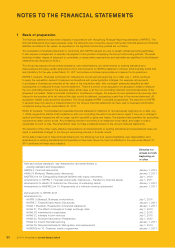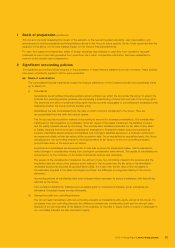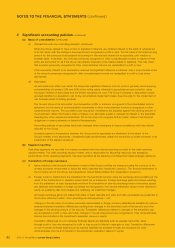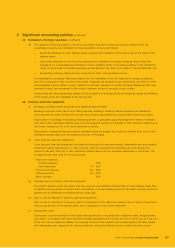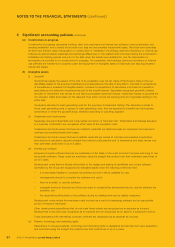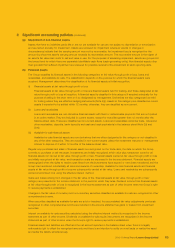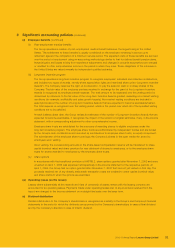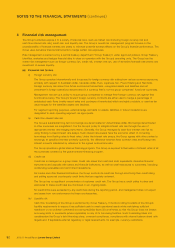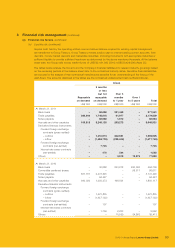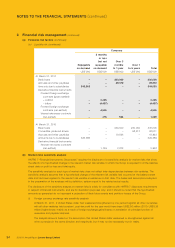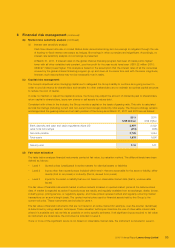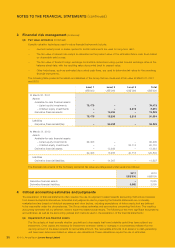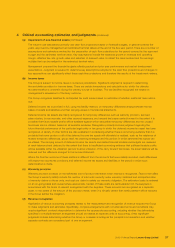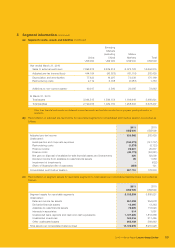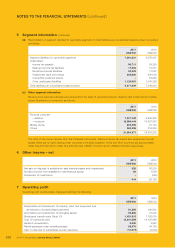Lenovo 2011 Annual Report Download - page 87
Download and view the complete annual report
Please find page 87 of the 2011 Lenovo annual report below. You can navigate through the pages in the report by either clicking on the pages listed below, or by using the keyword search tool below to find specific information within the annual report.
2010/11 Annual Report Lenovo Group Limited
90
NOTES TO THE FINANCIAL STATEMENTS (continued)
2 Significant accounting policies (continued)
(t) Revenue (continued)
(ii) Interest income
Interest income is recognized using the effective interest method. When a receivable is impaired, the Group
reduces the carrying amount to its recoverable amount, being the estimated future cash flow discounted at the
original effective interest rate of the instrument, and continues unwinding the discount as interest income. Interest
income on impaired receivables is recognized using the original effective interest rate.
(iii) Dividend income
Dividend income is recognized when the right to receive payment is established.
(u) Non-base manufacturing costs
Non-base manufacturing costs are costs that are periodic in nature as opposed to product specific. They are typically
incurred after the physical completion of the product and include items such as outbound freight for in-country finished
goods shipments, warranty costs, engineering changes, storage and warehousing cost, and contribute to bringing
inventories to their present location and condition. Non-base manufacturing costs enter into the calculation of gross
margin but are not inventoriable costs.
(v) Employee benefits
(i) Pension obligations
The Group operates various pension schemes. The schemes are generally funded through payments to insurance
companies or trustee-administered funds, determined by periodic actuarial calculations. The Group has both
defined benefit and defined contribution plans. A defined contribution plan is a pension plan under which the
Group pays fixed contributions into a separate entity. The Group has no legal or constructive obligations to
pay further contributions if the fund does not hold sufficient assets to pay all employees the benefits relating to
employee service in the current and prior periods. A defined benefit plan is a pension plan that is not a defined
contribution plan. Typically, defined benefit plans define an amount of pension benefit that an employee will receive
on retirement, usually dependent on one or more factors such as age, years of service and compensation.
The liability recognized in the balance sheet in respect of defined benefit pension plans is the present value of the
defined benefit obligation at the balance sheet date less the fair value of plan assets, together with adjustments
for unrecognized past service costs. Significant portion of the defined benefit obligation is calculated annually by
independent actuaries using the projected unit credit method. The present value of the defined benefit obligation
is determined by discounting the estimated future cash outflows using interest rates of high-quality corporate or
government bonds that are denominated in the currency in which the benefits will be paid, and that have terms to
maturity approximating to the terms of the related pension liability. In countries where there is no deep market in
such bonds, the market rates on government bonds are used.
Actuarial gains and losses arising from experience adjustments and changes in actuarial assumptions are charged
or credited to other comprehensive income in the year they arise.
Past service costs are recognized immediately in income, unless the changes to the pension plan are conditional
on the employees remaining in service for a specified period of time (the vesting period). In this case, the past
service costs are amortized on a straight-line basis over the vesting period.
For defined contribution plans, the Group pays contributions to publicly or privately administered pension insurance
plans on a mandatory, contractual or voluntary basis. The Group has no further payment obligations once the
contributions have been paid. The contributions are recognized as employee benefit expense when they are due
and are reduced by employer’s portion of voluntary contributions forfeited by those employees who leave the
scheme prior to vesting fully. Prepaid contributions are recognized as an asset to the extent that a cash refund or
a reduction in the future payments is available.
The Group’s contributions to local municipal government retirement schemes in connection with retirement benefit
schemes in the Mainland of China (“Chinese Mainland”) are expensed as incurred. The local municipal governments
in the Chinese Mainland assume the retirement benefit obligations of the qualified employees.


